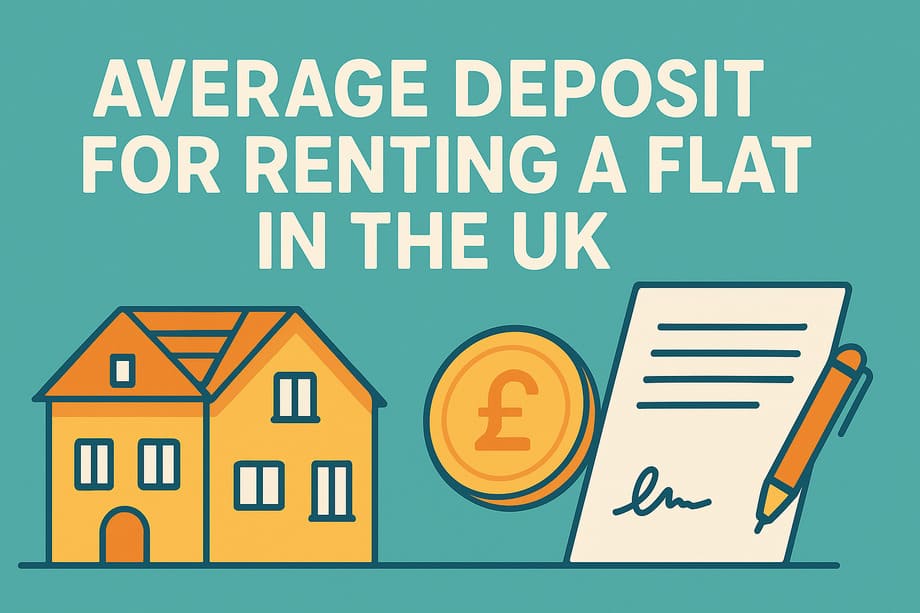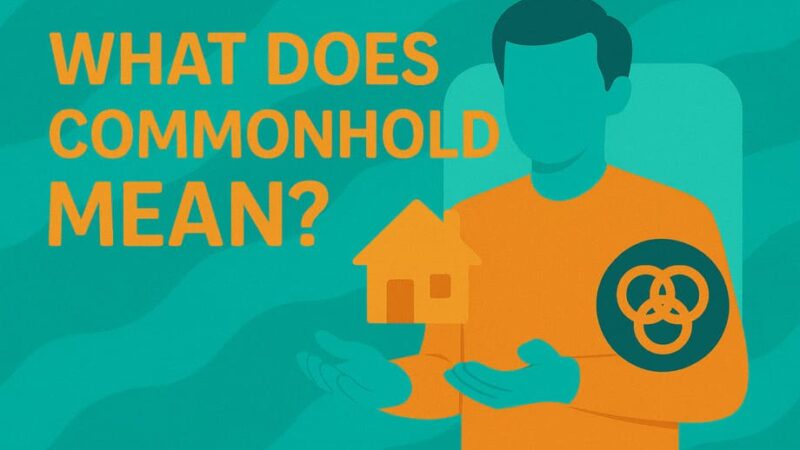Average Deposit for Renting a Flat in the UK (2025)

How Much is a Deposit to Rent in the UK?
The average rental deposit in the UK is now £1,434 based on current market conditions. This figure represents a significant portion of most renters’ monthly income, with the average tenant required to spend 64% of a typical month’s income just to cover tenancy deposit costs.
Understanding rental deposits is crucial for anyone looking to rent a property in the UK, whether you’re a first-time renter or moving to a new home. These upfront costs can be substantial, particularly in expensive areas like London, and proper planning is essential to avoid financial strain.
What is a Rental Deposit?
A rental deposit is a sum of money paid upfront to secure a rental property and provide landlords with financial protection against potential damage or unpaid rent. A rental security deposit is usually five weeks’ rent under current UK regulations.
The deposit serves multiple purposes:
- Secures the property for you during the application process
- Provides the landlord with security against damage beyond normal wear and tear
- Covers any unpaid rent or bills at the end of the tenancy
- Gives both parties confidence in the rental agreement
Average Deposit to Rent UK: National Overview
Current Market Rates
The data shows that the average monthly rent in the UK is now £1,243 per month. This means the average tenancy deposit now sits at £1,434, based on the common requirement that a deposit is set at the value of up to five weeks rent.
The average rental deposit in the UK is at least four weeks of rent, though most landlords now charge the maximum allowed under the Tenant Fees Act 2019.
Legal Limits on Deposits
Starting from June 2019, landlords can only collect a tenancy deposit of up to five weeks’ rent. This increases to six weeks for properties whose rent exceeds £50,000 per year.
The calculation for maximum deposit is: Monthly rent x 12 ÷ 52 x 5 = Maximum tenancy deposit
For high-value properties with annual rent over £50,000, the limit increases to six weeks’ rent.
Deposit to Rent a Flat London: Capital City Costs
London Deposit Ranges
London presents a particularly challenging market for renters. In London, it is common for landlords to ask for a deposit of six to eight weeks’ rent. This means that if the monthly rent is £1,500, the deposit could range from £9,000 to £12,000.
However, it’s important to note that these higher deposit requirements may not comply with current regulations, as landlords can only collect a tenancy deposit of up to five weeks’ rent under the Tenant Fees Act 2019.
London Rental Market Context
The average monthly flats to rent in London is around £1,500 – £1,600, though this varies significantly by borough. The average rent in London is about £26,316 per year, higher than the UK average of £15,240/year.
Based on current rental rates and legal limits, London deposits typically range from:
- Central London: £1,850 – £2,300 (based on average rents of £1,900-2,400/month)
- Outer London: £1,250 – £1,650 (based on average rents of £1,300-1,700/month)
Average Rental Deposit 2025: Regional Variations
England
- Average monthly rent: £1,301
- Typical deposit: £1,500 – £1,625 (5 weeks’ rent)
Scotland
- Average monthly rent: £944
- Typical deposit: £1,080 – £1,150 (5 weeks’ rent)
Wales
- Average monthly rent: £727
- Typical deposit: £835 – £900 (5 weeks’ rent)
Northern Ireland
Northern Ireland follows different regulations and deposit structures compared to the rest of the UK.
Income Impact: What Percentage of Earnings Goes to Deposits?
The financial burden of rental deposits varies significantly by income and gender:
Gender Pay Gap Impact
Because there remains a significant gender pay gap in the UK, the proportion of income being spent on deposits and rent is higher for women than it is for men.
Men:
- Average monthly income: £2,590
- Deposit as percentage of income: 55%
Women:
- Average monthly income: £1,858
- Deposit as percentage of income: 77%
Professional Impact
Further analysis by Zero Deposit shows that cleaners, hairdressers, and chefs are the worst-hit professions when it comes to rental market affordability:
- Cleaners (£969/month income): Deposit requires 148% of monthly pay
- Hairdressers (£1,103/month income): Deposit requires 130% of monthly income
- Chefs (£1,500/month income): Deposit requires 96% of monthly earnings
Even high earners face significant costs:
- Pilots: 34% of monthly income
- Doctors: 36% of monthly income
- Lawyers: 40% of monthly income
Additional Rental Costs Beyond the Deposit
Holding Deposits
A holding deposit secures the rental home for you while the agent checks your references. It’s usually one week’s rent. There are also rules for holding deposits, which cap the amount landlords can take to a maximum of one week’s rent.
First Month’s Rent
You pay rent upfront because your rent covers the upcoming month, not the previous one. Most landlords ask for one month’s rent before you move in.
Total Upfront Costs
Due to the pace of the rental market, this cost is often required within the same month meaning the average UK tenant is facing a total cost of £2,677 to secure a rental property, the equivalent of 120% of the average net monthly income.
Agency Fees and Other Costs
In England, 81.3% of renters didn’t pay a letting agency fee in 2022/23—but the other 18.7% did pay fees. It was most common for renters in England to pay between £200 and £300 in rental fees; and average rental fees are in the region of £300.
Deposit Protection Requirements
Legal Obligations
The landlord or letting agent legally has to put your deposit in a government protection scheme. Your landlord must put your deposit in a government-approved tenancy deposit scheme (TDP) if you rent your home on an assured shorthold tenancy that started after 6 April 2007.
Protection Schemes
In England and Wales your deposit can be registered with one of three government-approved schemes:
- Deposit Protection Service (DPS)
- mydeposits
- Tenancy Deposit Scheme (TDS)
Timeline Requirements
Your landlord or letting agent must put your deposit in the scheme within 30 days of getting it.
Getting Your Deposit Back
Return Timeline
Your landlord must return your deposit within 10 days of you both agreeing how much you’ll get back.
What Affects Deposit Return
If you cause any damage or fall behind with rent, the landlord can use your deposit to cover it. But if all goes well, you’ll get your whole deposit back when you move out.
Dispute Resolution
If you’re in a dispute with your landlord, then your deposit will be protected in the TDP scheme until the issue is sorted out.
Money-Saving Tips and Alternatives
Zero Deposit Schemes
Zero Deposit Schemes Instead of paying a deposit, you can reach out to certain UK companies that insure the flat. The landlord doesn’t pay for it. For you, the cost will come to about a week’s rent + service charge.
However, You do not pay a tenancy deposit if you use these companies. But there are other costs and you do not get the money back when you leave.
Budget Planning Tips
- Save gradually: Start saving for your deposit well in advance
- Compare areas: Consider more affordable boroughs or regions
- Negotiate payment terms: Some landlords may accept staged payments
- Use guarantors: Family members can sometimes act as guarantors to reduce deposit requirements
Government Support
Contact your local council if you need help paying the deposit. The council can tell you if you’re eligible for assistance schemes. If you’re on certain benefits you may also be able to get a Budgeting Loan, or a Budgeting Advance if you’re on Universal Credit.
2025 Market Outlook
Rental Growth Predictions
Rental growth is expected at 5% for the entire UK in 2025, which means deposit amounts will likely continue rising in line with rent increases.
London Market Trends
According to Property Reporter, London rentals could see an average cost increase of 7% by 2025, potentially pushing deposit requirements even higher in the capital.
Conclusion
The average deposit to rent in the UK represents a significant financial commitment, with most tenants now facing costs equivalent to five weeks’ rent. Understanding these requirements, planning ahead, and exploring all available options – including deposit protection schemes and government assistance – is crucial for successful property rental.
With deposits averaging £1,434 nationally and significantly higher in London, prospective renters should budget carefully and consider the total upfront costs, which can easily exceed £2,500 when including first month’s rent and potential fees. While the rental market remains challenging, understanding your rights and options can help make the process more manageable.
Last Updated on August 25, 2025 by James Cartwright







